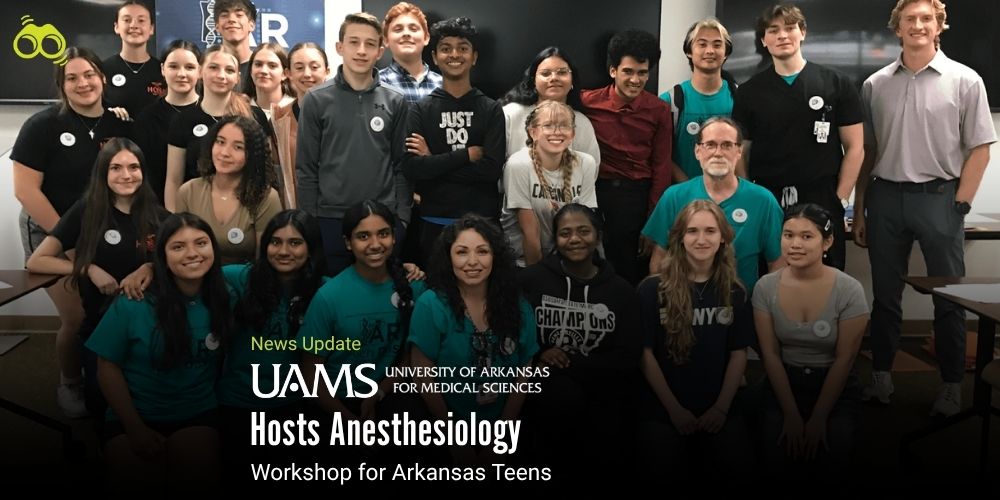Hands-On Medical Education Engages Northwest Arkansas Students at UAMS Workshop
Exploring Anesthesiology: UAMS Initiative Inspires Future Medical Professionals
The University of Arkansas for Medical Sciences (UAMS) Northwest Regional Campus recently hosted an immersive educational event designed to introduce high school students to the specialised field of anesthesiology. This initiative provided a hands-on learning experience, allowing students to engage with medical professionals while exploring career pathways in healthcare.
On 2 June 2025, it was reported that eighteen ninth-grade students from five school districts in Northwest Arkansas, Bentonville, Farmington, Fayetteville, Siloam Springs, and Springdale, had participated in the Exploring Anesthesiology Workshop for High School Students, which took place on 14 May. The workshop was co-sponsored by the UAMS Department of Neuroscience, the Department of Anesthesiology, and the UAMS Northwest Regional Campus.
Organisers explained that the workshop was designed to ignite students’ interest in medical careers. Under the leadership of Dr Kevin Phelan, Dr Faiza Khan, and Ana Sanchez, the event brought together faculty members and medical students, providing an engaging and interactive learning experience. Throughout the workshop, participants rotated through various interactive stations covering anesthesiology and neuroscience topics. The hands-on activities included examining plastinated specimens, using a virtual dissector to study peripheral nerves, and practising ultrasound-guided techniques by identifying nerves in standardised patients. Students also simulated needle injections using Blue Phantom models.
Additionally, participants explored sensory physiology, conducting two-point discrimination tests and experiencing cold exposure to simulate the effects of local anaesthetics. They examined cadaveric brain specimens, identifying major structures, and practised intubation on a manikin. Further activities included monitoring vital signs using stethoscopes and performing basic surgical suturing on simulated skin models. To demonstrate the collaborative nature of anesthesiology, a team-based anaesthesia simulation was included, showcasing how anaesthesiologists work together during surgical procedures.
The event received support from AR Tech DaSH education coordinator Sandra Perez, as well as medical students Justin Long, Kevin Zhao, and Chris Key. In addition, 10th-grade STEM Ambassadors, Prashita Rao, Leslie Reyes, and Andrea Richards, contributed to the learning experience, alongside nursing student Kristen Hoover and incoming medical student Kaleb Kovitch, who served as standardised patients to enhance the clinical simulations. One of the highlights of the workshop was a virtual appearance by Dr Faiza Khan from the UAMS Little Rock campus, where she provided an overview of anaesthesia types, including local, regional, sedative, and general. She also led a virtual tour of an empty surgical suite, explaining the equipment, monitoring systems, and safety protocols involved in anesthesiology, offering students a realistic perspective on operating room procedures.
Reflecting on the workshop, Dr Kevin Phelan emphasised that the event demonstrated UAMS’s commitment to community engagement, mentorship, and early exposure to healthcare careers. He noted that providing high school students with a structured and supportive environment was essential for inspiring curiosity and confidence in those considering a future in medicine. Through initiatives like this, UAMS Northwest Regional Campus continues to cultivate educational opportunities, fostering interest in healthcare careers and supporting students in their early medical exploration.
Editor’s Note:
Introducing young students to specialised areas of medicine at an early stage plays a big role in shaping their future career goals. The Exploring Anesthesiology Workshop for High School Students at the UAMS Northwest Regional Campus is a great example of how hands-on learning can spark curiosity and help students feel more confident. By giving them a chance to work with real medical professionals and take part in real-world activities, this type of workshop helps students connect what they learn in school with what happens in a medical career. Programs like this are very important and should be given more attention to help more students explore the field of medicine. Still, while these kinds of programs are very valuable, not all students have the same chance to take part. It is important to make sure that these opportunities reach more students, especially those from underrepresented communities who may not otherwise learn about careers in healthcare. Schools, colleges, and government leaders need to work together to make medical education programs more inclusive and easier for all students to access.
Skoobuzz asserts that by supporting early learning and strong mentorship, we can help develop the next generation of healthcare professionals who are skilled, motivated, and ready to make a difference in the world.














0 Comments (Please Login To Continue)